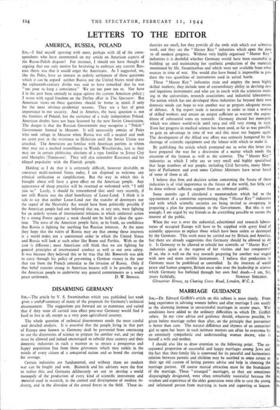AMERICA, RUSSIA, POLAND LETTERS TO THE EDITOR
find myself agreeing with most, perhaps with all of the corre- spondents who have commented on my article on American aspects of the Russo-Polish dispute.! For instance, I should not have thought of arguing that our only motive for hesitating to embrace any current Rus- sian thesis was that it would anger the Americans. As I suggested, we, like the Poles, have an interest in orderly settlement of these questions which it can be argued neither Russia nor the United States need share. An eighteenth-century divine was said to have remarked that he was " too poor to keep a conscience." We are too poor not to. Nor have I in the past been unready to argue against the current American policy ; I wrote with equal freedom on the Darlan affair in The Spectator. But American views on these questions should be borne in mind, if only for the most obvious prudential reasons. They are a fact of great importance to our security. And in America, the basic question is not the frontiers of Poland, but the existence of a truly independent Poland. American doubts have not been lessened by the new Soviet Constitution. The danger is that the Russian Government may recognise a " Polish " Government formed in Moscow. It will necessarily consist of Poles who took refuge in Moscow when Russia was still a neutral and took no overt part in the resistance to Hitlerism until the Soviet Union was attacked. The Americans are familiar with American patriots in whom they may see a marked resemblance to Wanda Wassilievska, just as they may see in certain plebiscites elections of a type familiar to Jersey City and Memphis (Tennessee). They will also remember Kuusinen and his alleged popularity with the Finnish people.
Holding as I do that it is extremely difficult, however desirable, to construct multi-national States today, I am disposed to welcome any ethnical unification or simplification. But the way in which this is brought about will have a great effect on the American people. Any appearance of sharp practice will be resented or welcomed with I told you so." Lastly, it should be remembered that until very recently, if not still, Russia was the chief beneficiary of Lease-Lend. I think it is safe to say that neither Lease-Lend nor the transfer of destroyers nor the repeal of the Neutrality Act would have been politically possible if the American people had not believed that we, at any rate, were fighting for an orderly system of international relations in which unilateral action by a strong Power against a weak should not be held to close the ques- tion. The mass of the American people have, to be frank, no confidence that Russia is fighting for anything but Russian interests. At the most they hope that the rulers of Russia may see that among those interests is a world order, not a continental order in which the United States and Russia will look at each other like Rome and Parthia. With us the case is different ; most Americans still think that we are fighting for general principles of international conduct as well as our own safety. It was because they believed this to be true that Mr. Roosevelt was able to carry through his policy of preventing a German victory in the year that ran from the French armistice to the invasion of Russia. Only if that belief remains strong in American breasts will it be possible to get the American people to underwrite any general commitments to a world


























 Previous page
Previous page